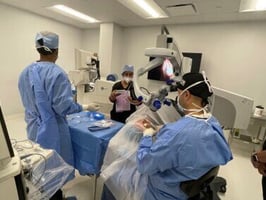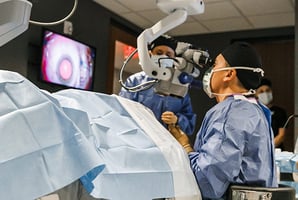Move to Office-Based Surgery With few Ambulatory Surgery Centers (ASCs) in northern Virginia, John...
Thinking About Transitioning to Office-Based Surgery? Read This.
Thinking About Transitioning to Office-Based Surgery? Read This.
Office-Based Surgery
Office-based surgery (OBS) is any surgical or invasive procedure performed by a licensed physician in a location other than a hospital or ambulatory surgery center. These procedures, which include cataract surgery, retina procedures, refractive lens exchange, and oculoplastics, are typically performed in a suite located within the physician’s office and utilize minimal to moderate anesthetics.
Proponents say offering in-office surgery gives them increased flexibility. As well as, staff and equipment advantages compared to hospitals or ASCs.
The following is an abridged version of the full-length article, Office-Based Surgery: Tales From the Front, which can be read in totality HERE.
Bringing Office-Based Surgery to Your Clinic
Orest Krajnyk, MD is a board-certified cataract and refractive surgeon in New Smyrna Beach, Florida, and a physician CEO graduate from Kellogg Business School. He transitioned to office-based surgery in 2019.
“Being the first practice to work with iOR was a leap of faith, but I trusted the people I was working with. They came in, credentialed us and helped us set everything up. If there are complications, we have a protocol. And we’re certified by the American Association for Accreditation of Ambulatory Surgery Facilities. It’s not like we’re just doing this casually.”
Dr. Krajnyk says he currently uses the surgical suite once a week.“If it gets busier, I can add days as needed,” he notes. “I do 15 to 20 cataracts a week or so, all in one day. I start at about 8:30 a.m. and I’m usually done by 2 or 3 p.m.”
Robert F. Melendez, MD, MBA, is the CEO and founder of the Juliette Eye Institute in Albuquerque, New Mexico. He says office-based surgery allowed him to increase patient volume and grant his patients an added layer of comfort and familiarity.
“I was shocked by how effective office-based surgery is, how safe it is, and the great outcomes we’ve produced,” he says. “If you’d told me a couple of years ago that I’d be doing office-based surgery, I would have said you were crazy. I wasn’t aware of anyone doing that here in New Mexico. Now, three of my friends have started office-based surgery suites in the past year.”
Dr. Melendez says patients are thrilled to be able to get their surgery done at his office. “The patient experience is definitely enhanced with office-based surgery,” he says. “Patients come to the same location as they do when I see them in the clinic. So, their anxiety level is already diminished. They don’t have to drive to a different surgery center, get lost, and end up running late, which gets them all worked up by the time they get there on the day of surgery.
“In fact, we’ve found that patients require less sedation, which creates an overall better patient experience,” he continues. “Patients get to see the same staff they just saw two or three weeks prior for the exam. And patients know them.”
What Resources Do I Need to Implement an In-Office Surgical Suite?
Dr. Krajnyk says it’s possible to set up an in-office surgical center on your own. However, he believes it might not be advisable. “I’ve seen people do it and it turned out OK,” he says. “But it’s a tradeoff; you spend less money but a lot more time solving problems and finding the right way to do something. And, with outside help, the agency shares some of the liability if something goes wrong.”
Jonathan Feistmann, MD, a retinal specialist practicing at NYC Retina in New York City, utilized iOR to help him and his partner, Julia Shulman, MD, set up an office-based surgical suite in May of 2022.
“We tell the patient that we’ll do it right here and we’ll get it done today. Instead of spending time on the phone calling people and begging for a slot, our staff can spend their time and energy taking care of the patient and getting things ready for the surgery. This has been very gratifying for me and the staff.”
Is An Office-Based Surgery Model Sustainable?
Dr. Melendez says that some people seem to think that in-office surgery is done in an exam room. Although, he says, “nothing could be further from the truth.” “Our OR is a completely sterile environment. It’s all approved by the same accrediting bodies that approve ASC’s.”
Dr. Melendez explains that profitability hasn’t been a problem for him because he has a premium-lens-oriented practice. “I believe that most doctors who choose to set up an office-based surgery center are trying to offer a more premium experience for patients,” he says. “That kind of practice tends to have higher rates of conversion to premium lenses such as Panoptix, Vivity, or the Lightadjustable Lens. Combine that with the fact that you’re not paying fees to an ASC, and your profitability goes up.”
Dr. Feistmann says he realizes that cost is a big concern for most surgeons. “Many surgeons I talk to like the idea of having an OR in their office. But, they’re worried about the cost and reimbursement questions,” he says. “We’ve just started, so although we have a plan, we don’t have a lot of the data about reimbursement yet. But we’ve gone ahead anyway because it’s clearly good for our patients. It eases our stress dramatically when we have to manage an emergency.
“The other thing to remember is that profitability isn’t just a matter of how much we’re paid,” he points out. “It’s also a question of how much time we spend to earn that payment. I think of it as a ratio. Where the numerator is the payment and the denominator is the time I spend on the work. My main goal is to shrink the denominator, meaning taking less time to do an emergency case at the hospital or avoid taking an entire OR day away from office patients just to do a few surgical cases at the surgery center. This way, even if the numerator (payment) decreases slightly, if the denominator (time) decreases even more, proportionally, I’m actually ahead. And if we can figure out a way to increase the numerator while decreasing the denominator, then we’ll be way ahead.”
The above article is an abridged version of the full-length article, Office-Based Surgery: Tales From the Front, which can be read in totality HERE.
Interested in exploring the potential for in-office surgery at your clinic?
Are you interested in transitioning to office-based surgery? Do you have experience transitioning to office-based surgery? Comment below!


